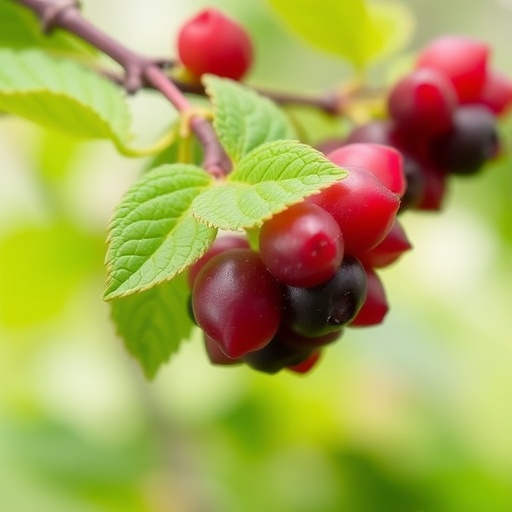In a groundbreaking development that merges the fields of nutrition science, neurobiology, and natural product chemistry, researchers have unveiled compelling evidence pointing to the protective effects of mulberry vinegar in ameliorating cognitive impairments induced by inflammatory stimuli. The study, recently published in Food Science and Biotechnology, elucidates the intricate molecular interplay between mulberry vinegar’s bioactive components and pivotal neuroinflammatory pathways implicated in cognitive decline. This research sheds transformative light on potential dietary interventions capable of modulating neurodegenerative processes, a domain historically reliant on pharmaceutical approaches.
The investigation employed advanced High-Performance Liquid Chromatography coupled with Ultraviolet detection (HPLC/UV) to comprehensively profile the phytochemical constitution of mulberry vinegar. This technique enabled the precise identification and quantification of key bioactive molecules, including flavonoids, phenolic acids, and other antioxidant constituents. Such detailed chemical fingerprinting is crucial because it allows for correlating the biochemical complexity of natural extracts with their biological efficacy, bridging the longstanding gap between traditional remedies and modern pharmacological validation.
.adsslot_nuCKS56Vk8{ width:728px !important; height:90px !important; }
@media (max-width:1199px) { .adsslot_nuCKS56Vk8{ width:468px !important; height:60px !important; } }
@media (max-width:767px) { .adsslot_nuCKS56Vk8{ width:320px !important; height:50px !important; } }
ADVERTISEMENT
The researchers meticulously demonstrated that mulberry vinegar administration attenuates the activation of the NF-κB signaling pathway. NF-κB functions as a transcription factor that governs the expression of numerous pro-inflammatory cytokines. Under pathological conditions, its overactivation contributes to chronic inflammation and neuronal damage. By dampening NF-κB activity, mulberry vinegar effectively mitigated the production of inflammatory mediators, thereby curbing neuroinflammation and its deleterious consequences.
Moreover, the study’s findings reveal a pronounced inhibitory effect of mulberry vinegar on amyloidogenesis, the pathological accumulation of amyloid-beta (Aβ) peptides, which aggregate to form senile plaques – central to Alzheimer’s disease neuropathology. Amyloidogenesis is exacerbated during chronic inflammatory states and is closely intertwined with the NF-κB pathway. The suppression of this process suggests a dual mechanism whereby mulberry vinegar targets both upstream inflammatory signaling and downstream pathological protein accumulation.
At the molecular level, the anti-amyloidogenic property of mulberry vinegar can be attributed to its rich polyphenolic profile. Flavonoids and phenolic acids, widely acknowledged for their antioxidant capacity, scavenge reactive oxygen species (ROS), which otherwise facilitate oxidative stress—a significant driver of amyloid plaque formation and neuronal death. By reducing oxidative stress, these compounds create a neuroprotective milieu that preserves cognitive function.
The cognitive performance of experimental subjects was assessed using behavioral paradigms sensitive to memory and learning deficits typically induced by LPS. Remarkably, subjects treated with mulberry vinegar displayed marked improvements in these cognitive assessments compared to controls. This behavioral recovery aligns with the observed biochemical and cellular modulatory effects, underlining the therapeutic potential of dietary bioactives in managing brain health.
Importantly, this research not only advances the understanding of mulberry vinegar’s functional properties but also sets a precedent for the broader application of fermented plant products in neuroprotection. Fermentation processes, as exemplified by vinegar production, modify and sometimes enhance the bioavailability of phytochemicals, potentially augmenting their biological activity. This facet underscores the complex relationship between food processing, nutraceutical efficacy, and health outcomes.
The methodology adopted incorporates robust mechanistic studies, including gene expression analyses and protein assays, to delineate the pathways influenced by mulberry vinegar. The detailed examination of NF-κB activity involved quantifying nuclear translocation of its subunits and downstream effector molecule levels, ensuring a comprehensive understanding of signaling modulation. Concurrently, markers of amyloidogenesis were quantified through immunoblotting and histological staining techniques, enabling precise evaluation of pathological hallmark mitigation.
Therapeutically, the implications of this study are profound. With neurodegenerative diseases imposing a growing societal and economic burden globally, the identification of accessible, food-derived neuroprotective agents offers a complementary strategy to existing interventions. The safety profile and dietary acceptability of mulberry vinegar further enhance its translational appeal, providing a feasible adjunctive approach to neuroinflammation-associated cognitive impairment.
It is also noteworthy that this research captures the evolving paradigm wherein natural products, frequently dismissed as anecdotal remedies, are rigorously scrutinized using cutting-edge analytical tools and contemporary biological models. This integration fosters an evidence base that may facilitate regulatory acceptance and the eventual incorporation of such substances into clinical nutrition guidelines.
Future research avenues suggested by the study encompass dose-response investigations, long-term safety profiling, and exploration of synergistic effects with other bioactive compounds. Additionally, clinical trials in human populations will be indispensable to validate the preclinical outcomes and ascertain efficacy in complex pathophysiological contexts.
The interplay between gut microbiota modulation and neuroinflammation represents another promising frontier, given that vinegar consumption alters gastrointestinal microbial profiles. Delineating whether mulberry vinegar’s neuroprotective effects partially derive from gut-brain axis modulation could unlock yet another dimension of its therapeutic potential.
In summary, the pioneering research into mulberry vinegar’s capacity to modulate NF-κB signaling and suppress amyloidogenesis heralds an exciting development in the quest to combat cognitive decline through dietary means. The convergence of advanced analytical chemistry, neurobiology, and nutrition science in this work exemplifies the innovative interdisciplinarity needed to address complex chronic diseases. As the scientific community continues to unravel the molecular underpinnings of natural products, such discoveries pave the way for more integrative and holistic approaches to brain health and aging.
Subject of Research:
Article Title:
Article References:
Image Credits: AI Generated
DOI: https://doi.org/10.1007/s10068-025-01971-3
Keywords:
Tags: antioxidant properties of mulberry vinegarbioactive components in mulberry vinegarflavonoids and neuroprotectionHPLC/UV analysis of phytochemicalsinflammation and cognitive functionlipopolysaccharide-induced cognitive impairmentmolecular pathways in cognitive healthmulberry vinegar and cognitive declinenatural products in neurobiologyneurodegenerative diseases and nutritionneuroinflammation and dietary interventionstraditional remedies in modern science





